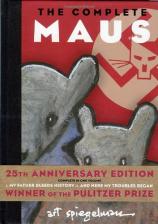The Complete Maus
Review
The Complete Maus
A child of Holocaust survivors, Art Spiegelman created a striking retelling of Nazi Germany in Maus. He took a disturbing quote from Adolph Hitler (“The Jews are undoubtedly a race, but they are not human”) and used it as inspiration for turning the Holocaust into a grisly cat-and-mouse game. Moreover, he laid bare his own troubled relationship with his father and his guilt over the suicide of his mother. The result is epic and so simple at the same time; the combination is ultimately so disarming that the reader is overwhelmed by the sheer force of it all. You don’t so much read Maus as surrender to it. The atrocity of the situation is magnified by the storyteller’s innate gift at bringing out such specific examples of humanity, from its simple joys to its deep sadnesses. Is there something very telling about the child of a Holocaust survivor depicting his own people as rodents and their oppressors as sly cats? Possibly. The question is certainly worth pondering while reading, especially considering how Spiegelman and his father interact and the painful way they can’t ever seem to see eye to eye. But the use of cartoon animal imagery in the book shows off the fact that this is the most insidious example of the predator and prey relationship in recent human history. The first Maus won the Pulitzer Prize in 1992 (its almost equally moving sequel, Maus II, is collected here as well) and was nominated for a National Book Critics Circle Award, and deservedly so.
Reviewed by John Hogan on November 19, 1996
The Complete Maus
- Publication Date: November 19, 1996
- Genres: Graphic Novel
- Hardcover: 296 pages
- Publisher: Pantheon
- ISBN-10: 0679406417
- ISBN-13: 9780679406419










